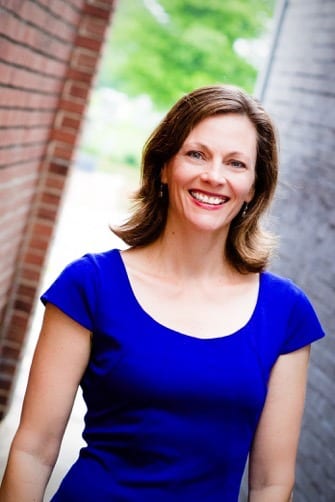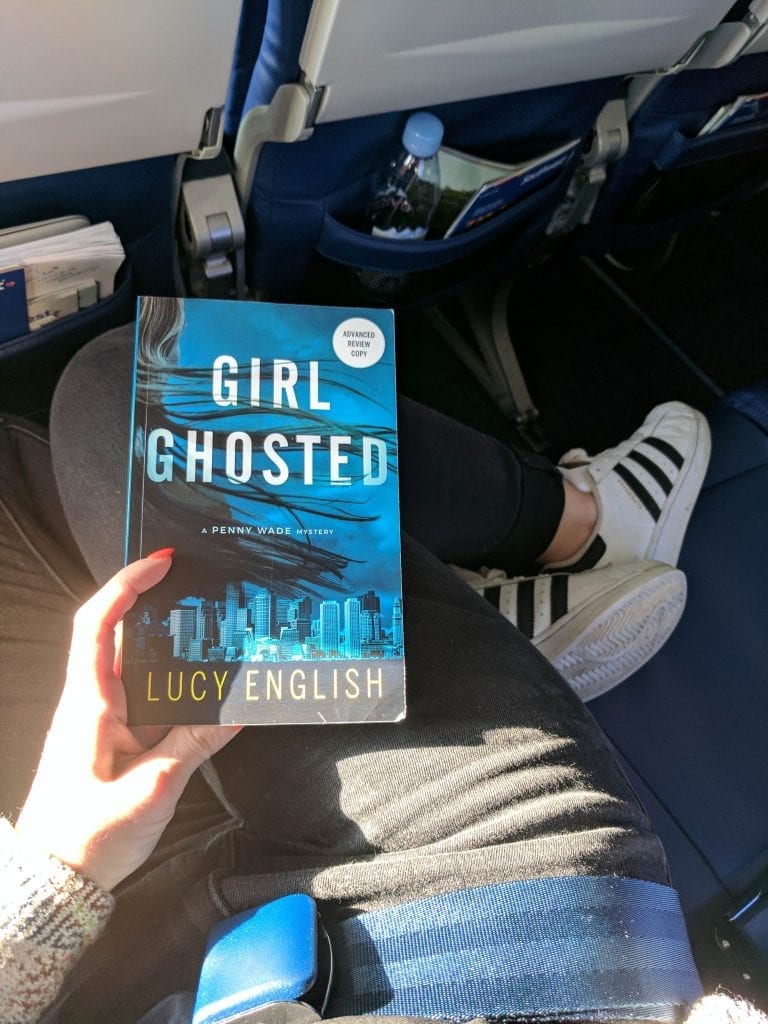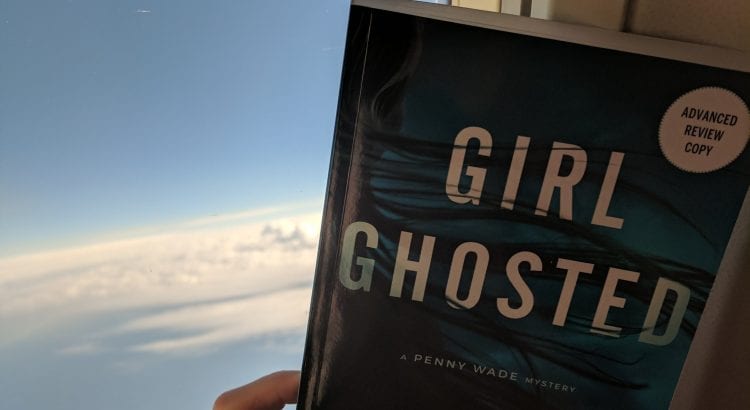Author Lucy English‘s latest Penny Wade mystery novel debuts this month from New Sun Press!
Here’s what’s cooking in “Girl Ghosted”:
Penny Wade is a young social worker in South Boston, earnestly trying to help others, while also hoping to find love.
Online dating seems like the perfect way to meet new people, and distract her from a painful past. After a string of disastrous first dates, she finally meets a man and tumbles into love with him. Her happiness is short-lived, however, when digital dating turns deadly as a killer scans dating profiles to select his targets.
Penny must manage her challenging caseload, including a particularly heart-tugging case in which she’s working to support a depressed young mother and assess allegations of abuse, while also trying to find a murderer before she is “ghosted” for good.

Lucy’s writing power comes in the form of a deft balance of empathy and humor, both of which underlie the juicy thriller at this story’s heart.
Below, the author gives some great insight on how she’s worked to nail that voice (because it is work and she’s refreshingly honest about that), how she balances writing with being a single mother of two boys (Lucy, you’re a hero), what writing tools she uses, why she writes and social workers, and more.
Enjoy! Then get your own copy of “Girl Ghosted” here.
Why do you write fiction?
I think I started for the challenge. Then I got hooked. The stories and characters exist for me now, so I’m sort of compelled to write them down. I remember once reading an interview with Alice Walker about how she entered the story world and saw stories unfold that didn’t feel like they were coming from her. I thought that was strange but now it happens to me. But to be clear, it didn’t just start happening on its own. I had to really put in effort and I still do have to work hard at the writing. People who want to write tell me “I don’t have stories in my head.” Well, neither did I. I started out in a very mechanical way. I decided to write a mystery because it would have lots of structure to guide me. I need a crime, and suspects, and red herrings, and a good flawed heroine. It was only through that process that things began to come alive.
I love that I get to live different things through Penny. In some ways she’s very intentionally unlike me because I want to see what it’s like to be someone else. I can sort of live an additional life through her and expand my experiences and gain compassion in different ways that in my “real” life.
I love that I get to live different things through Penny. In some ways she’s very intentionally unlike me because I want to see what it’s like to be someone else.
What does your daily writing process look like when you’re working on a novel?
I’m not terribly consistent. Sometimes I write sitting on my bed, sometimes in my little home office, which is a tiny stand-alone building in my back yard. Sometimes I write in my dining room at my big farm table covered in crumbs and sticky smears from boys. If I listen to music it’s usually classical, but mostly I prefer quiet because when I’m really writing (as opposed to doing research or planning), I go into Penny’s world and I don’t want anything anchoring me back in mine.
Are there any rookie mistakes you made when writing your first book that you would offer up to new writers as things to avoid or at least be aware of?
I had tons of mistakes in my first book. I worked with a great developmental editor, who helped me to do three major redrafts! I think the main thing I learned was that the story can take on a life of its own and I have to respect that. I had the murderer wrong at first in Ruby Milk. Ooops. I learned that there’s some stuff I don’t get to control and if I’m stubborn, I’ll just end up going back and re-writing because the story knows, and I need to listen. I think my advice would be to first plot things out as well as possible so that the structure for the book is solidly in place, then truly enter the world and write the flesh onto the bones. When I get stuck I grab a spiral notebook and interview my characters to find out what I need to know. This is really great because they know what’s happening and are always willing to help.
Do you have a set amount of words you write each day or how do you approach meeting a book deadline?
In writing mode, I’ll often set a goal of 2,000 or 3,000 words per day but I don’t hold myself to it. Some days I’ll write 5,000 in what seems like just moments. Other days I need to do research, fix a problem, or just move slowly because that’s the kind of day I’m having. I try to remind myself that I do this by choice and for love, so there’s really no urgency beyond my own momentum.
In writing mode, I’ll often set a goal of 2,000 or 3,000 words per day.
How do you write while working and being a mother? I know that sounds trite, but I mean it. Any tips on juggling everything and working writing into a busy schedule?
I’m very lucky that I work from home for my day job so I don’t have to put on makeup or commute. That saves time. However, I think my real secret is that I don’t watch tv. The New York Times reported that the average person watches five hours per day. I’m sure people are doing other stuff while they watch, but I can’t imagine multitasking writing a book with watching tv! I think that’s my best secret time saver! Otherwise I try to keep the calendar organized with the boys’ activities etc. and I don’t take on a lot of volunteer stuff at their schools or anything like that. (Bad mom confession: I don’t really enjoy that stuff anyway.) As I write this, I’m on vacation with my boys on Cape Cod. It is 6 am and they’re still asleep. My brain works best early in the morning. I think knowing when you’re sharpest is important. I can do twice as much per hour at six in the morning compared to nine at night.
Why write about social service professionals? What challenges present themselves when writing about a world you know intimately in real life and how to you face them down?
I write about a social worker because I admire them enormously. While I’ve worked with them in a liaison capacity, I’ve never been one, and one-on- one work isn’t my strength. So, I’m not overly close to it. I think that helps because Penny can make mistakes and it doesn’t freak me out as a professional. Think how boring it would be to read about Penny the Perfect Professional!
As someone working in the corporate world, I find I need to create “the business case” to get large employers to provide helpful benefits and supports for employees. That’s just how big organizations work — lots of decision makers and a need for a rational case to spend money. I’m inspired by the world of social work because it’s full of people who are doing the right thing because it’s the right thing. There’s a purity there that I appreciate and want to celebrate in my books.
Do you have any book recommendations for aspiring writers?
Writing funny stuff can be hard and there are tons of really bad books about it on the market, so one of my favorite book recommendation is The Hidden Tools of Comedy by Steve Kaplan. He basically says that funny is an ordinary man or woman, without special skills or knowledge, up against seemingly insurmountable odds, and never giving up. That’s Penny. That’s me. That’s all of us, right? Life is funny!
I also love Story by Robert McKee, which is actually about writing screen plays. I love books on writing screen plays because the story elements are so well thought out and there’s something clean about how good plots are described.
There is a series of books by Angela Ackerman and Becca Puglisi that are great references when writing. They include The Positive Trait Thesaurus, The Negative Trait Thesaurus, The Emotion Thesaurus, and The Urban Settings Thesaurus (those are the ones on my shelf — there are others).

I love books on writing screen plays because the story elements are so well thought out and there’s something clean about how good plots are described.
Do you have any podcasts you listen to or tech tools you use to help you with the writing process?
I learn much better when I read the written word, so I have tons of books full of highlights, notes and post-it flags, but I tend not to listen to podcasts when it comes to content on writing. The tool I use is Scrivener, which is software that helps to organize a book. I can see a list of chapter folders containing each scene on the left-hand side. I name the scenes and that makes it easy to move around in the book. I don’t always write scenes in order. It also helps me to keep notes like what day it is in each scene, etc. It isn’t a perfect tool but it’s way better than trying to deal with an enormous Word document.
Penny Wade! How did you approach character development for Penny in order to make her a dynamic, multi-dimensional female protagonist?
Penny’s character was inspired by social workers. She’s fighting an uphill battle trying to help people in a system where few resources are available. She gets in trouble for getting too invested in her clients and spending too much time. She wears herself out physically and emotionally trying to help while also trying to create a life for herself separate from work. She has demons to deal with including having lost her little sister to a heart defect when she was young. The drive to “fix” and “save” is deep-rooted in Penny. She also has her struggles in relationships with men, and her own decisions about what she wants from a relationship. She isn’t the white-picket-fence type, and isn’t sure how to construct the life she wants because she doesn’t have a template like “get married, move to the suburbs, have kids”. Penny is dynamic and complex and very real to me, so the challenge isn’t making her those things, but getting her on the page effectively.
If you could have dinner with three people, living or dead, who would they be and why?
One would have to be Robert B. Parker, author of the Spenser mysteries series and role model for me. His books dealt seriously and sensitively with important social issues. Like Penny Wade Mysteries, they were set in Boston.
I’d also have many dinners with Robert B. Parker’s character, Spenser. He would be single. We’d go to the Bristol at the Four Seasons in Boston, where he often drank and dined. A key scene in my first book, Ruby Milk, is set there in homage to Parker and Spenser.
I think the third person would be Eva Peron. There are so many different takes on her life, but there’s no doubt it was interesting and she was a talented, brilliant, and brave woman.
